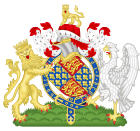De natis ultra mare facts for kids
| Act of Parliament | |

|
|
| Long title | A Statute for those who are born in Parts beyond Sea. |
|---|---|
| Citation | 25 Edw. 3. Stat. 1 |
Quick facts for kids Other legislation |
|
| Amended by |
|
|
Status: Amended
|
|
| Revised text of statute as amended | |
The De natis ultra mare (pronounced: Dee NAH-tiss UL-tra MAHR-ay) was an important law in England. It is also known as the Status of Children Born Abroad Act 1350. This law was made in 1351 during the time of Edward III, a powerful English king.
This law helped decide the rights of children born outside of England. It was one of the very first steps in creating what we now call British nationality law. The main reason for this law was to sort out who could inherit land or property in England, especially for children born overseas. This was a big issue during the Hundred Years' War, a long conflict between England and France.
Contents
What Was This Law About?
The De natis ultra mare law was simple but very important. It said that if a child was born outside of England, but their parents were loyal to the King of England, that child could still inherit property in England.
This was a big deal because, before this law, it wasn't always clear. People worried that children born in other countries might not be true English subjects. This law made sure that families could pass on their land and wealth, even if some family members were born abroad.
Why Was This Law Needed?
Imagine a time when people traveled more for wars or trade. English families might live in other countries for a while. If a child was born there, would they be considered English? Could they still get their family's land back home? This law answered those questions.
It helped keep families connected to their English heritage and property. It also made sure that the king had loyal subjects, no matter where they were born.
How Did This Law Affect History?
This old law from 1351 was used again many years later. It came up in important discussions about who could become the ruler of England.
For example, after Elizabeth I died, there was a big debate about who should be the next king or queen. Some people thought this old law might stop certain claimants from the House of Stuart (a Scottish royal family) from taking the throne.
The law was also mentioned in a famous legal case called Calvin's Case. This case was about whether Scottish people born after 1603 (when the crowns of England and Scotland were united under one king) could inherit land in England. The De natis ultra mare law was used to argue that they should have this right. It showed how a very old law could still be important hundreds of years later.
Key Part of the Law
Here is a simplified version of the most important part of the law:
All children who will be born outside the King's loyalty, whose fathers and mothers at the time of their birth are loyal to the King of England, shall have the same rights and benefits to inherit property within England, just like other inheritors. This is true as long as the mothers of such children travel overseas with the permission and wishes of their husbands.
This quote shows that the law focused on the parents' loyalty to the English king. It also mentioned that mothers needed their husbands' permission to travel. This was common for women in those times.
Legacy of the Act
The De natis ultra mare law was a very early step in defining who was considered a citizen or subject of a country. It helped shape the idea of nationality and citizenship that we have today. While it has been changed and updated by newer laws, its original ideas were very important for its time. It shows how laws from hundreds of years ago can still influence how countries think about their citizens.

